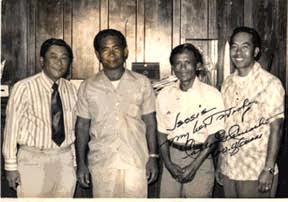War Reparations Interview

War reparations is something that hardly receives much attention anymore. It used to be the issue that could make or break a candidate for delegate in Guam. It was something that people pushed for, and always seemed likely to get in some form, but never materialized. War reparations in the Chamorro context, is about compensation for the atrocities, suffering and destruction that Chamorros experienced during World War II at the hands of occupying Japanese forces. Chamorros did receive some compensation for what had happened in the immediate postwar era, but a commission later determined that they were not given enough information or access to those channels of redress and that further compensation should be awarded. This issue is waning in political importance due to the fact that the war generation is dying out. The number of people who would be eligible for compensation decreases with each year. The impetus is slowly being quashed as time ravages our elders and making the issue ap



